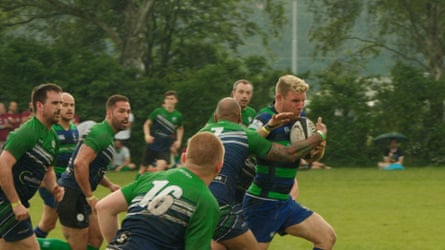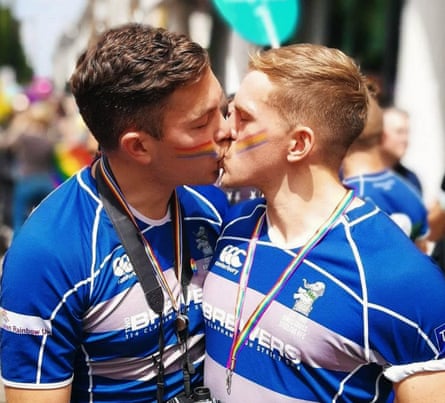When I read Dan Palmer’s brave and honest coming out column in the Sydney Morning Herald last week, suddenly I was jolted back to a dark place seven years ago when I almost took my own life. The former Wallabies prop described a moment when he was driving recklessly, the feeling of “death felt preferable to anybody discovering [he] was gay.”
For me, I was working as a television reporter in Townsville in 2013 and driving to an interview. Suddenly I felt this heavy urge to have an accident. With all my strength I pulled over and called my best friend who told me to go to the doctor. I did immediately. He prescribed me antidepressants which helped fight off the black dog that had been chasing me since high school. Finally, it had caught up.
Unlike Palmer, I was already out. In fact, I was outed when a friend who I had one of my first sexual experiences with secretly recorded it and showed the video around school. That only confirmed what the kids already knew and the bullying went from bad to horrendous. I remember wagging almost every sports class, even though I played rugby as a kid and enjoyed it – because in those changing rooms and in that masculine environment, that’s where I copped it the most.
So you can imagine my surprise when years later, a rugby club would go on to change my life. Not just any rugby club, the world’s first gay rugby club, the Kings Cross Steelers in London.

Four years ago I moved to the UK seeking an adventure and trying to shake that black dog off once and for all. My flatmate was a member of the Steelers and suggested I try it out. When I ran around the oval at the first training session, unfit and overweight (thanks to the Heathrow injection) I was a lap behind everybody. I didn’t want to embarrass myself by giving up and as I finished, lagging far behind, everybody in the club stood there clapping me on. It was a feeling I’ll never forget.
Then in my first game, it all came back to me. I scored the most tries. People were patting me on the back and wanting to get to know me at the pub afterwards. Finally, I had found a place where I belonged. And, as a bonus, I went on to meet and marry one of my teammates, John – the funniest and kindest person I know (not to mention a great rugby player).
By this point, I was working as the Europe correspondent for 10 News. I had my own camera and decided to make a documentary about the Steelers because I noticed the sport was having this transformative effect on nearly everyone in the club. I’d heard people talk about the power of sport before, but never believed it until now. Here, queer people were reclaiming their place on the pitch – an arena they grew up being told they didn’t belong in.

In fact, from this single club, there are now 80 gay and inclusive rugby clubs around the world including five in Australia. In the Steelers’ first season, they sent out 120 invitations to play against teams in Essex. Only a handful accepted. Many thought it was an April fool’s joke because the letter was sent around that time. There was the occasional homophobic sledge, but over time the Steelers won the respect of these straight burly British men because not only did they beat them on occasion, they showed them that we’re all pretty much the same.
Flash forward to me taking my camera to Amsterdam to film the club at the Bingham Cup, the world cup of “rainbow” rugby. I filmed my team hoping to get enough material for a feature. I sat on the footage and a year passed. It was only when Israel Folau began posting “hell awaits homosexuals” on social media that I realised I had to tell the story of the club – and my own story.
So like Dan Palmer, I too have Folau to thank in small part. My film has played in scores of festivals across eight countries. When it premiered at the New Zealand International film festival (after the All Blacks tweeted the trailer) a teenager messaged me saying he was struggling and getting bullied at school, but my film gave him hope that things get better.
To me it made everything I had gone through worth it. The bullying. The self doubt and the self-loathing. I guess the lesson I learned is you have to keep searching for happiness, because you just might find it where you least expect. In my case, it was the rugby pitch.
Eammon Ashton-Atkinson is the US correspondent for 10 News First. His independent documentary Steelers: the World’s First Gay Rugby Club is in cinemas across Australia now
